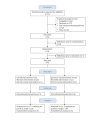Effectiveness of Electronic Quality Improvement Activities to Reduce Cardiovascular Disease Risk in People With Chronic Kidney Disease in General Practice: Cluster Randomized Trial With Active Control
- PMID: 39899838
- PMCID: PMC11833263
- DOI: 10.2196/54147
Effectiveness of Electronic Quality Improvement Activities to Reduce Cardiovascular Disease Risk in People With Chronic Kidney Disease in General Practice: Cluster Randomized Trial With Active Control
Abstract
Background: Future Health Today (FHT) is a program integrated with electronic medical record (EMR) systems in general practice and comprises (1) a practice dashboard to identify people at risk of, or with, chronic disease who may benefit from intervention; (2) active clinical decision support (CDS) at the point of care; and (3) quality improvement activities. One module within FHT aims to facilitate cardiovascular disease (CVD) risk reduction in people with chronic kidney disease (CKD) through the recommendation of angiotensin-converting enzyme inhibitor inhibitors (ACEI), angiotensin receptor blockers (ARB), or statins according to Australian guidelines (defined as appropriate pharmacological therapy).
Objective: This study aimed to determine if the FHT program increases the proportion of general practice patients with CKD receiving appropriate pharmacological therapy (statins alone, ACEI or ARB alone, or both) to reduce CVD risk at 12 months postrandomization compared with active control (primary outcome).
Methods: General practices recruited through practice-based research networks in Victoria and Tasmania were randomly allocated 1:1 to the FHT CKD module or active control. The intervention was delivered to practices between October 4, 2021, and September 30, 2022. Data extracted from EMRs for eligible patients identified at baseline were used to evaluate the trial outcomes at the completion of the intervention period. The primary analysis used an intention-to-treat approach. The intervention effect for the primary outcome was estimated with a marginal logistic model using generalized estimating equations with robust SE.
Results: Overall, of the 734 eligible patients from 19 intervention practices and 715 from 21 control practices, 82 (11.2%) and 70 (9.8%), respectively, had received appropriate pharmacological therapy (statins alone, ACEI or ARB alone, or both) at 12 months postintervention to reduce CVD risk, with an estimated between-trial group difference (Diff) of 2.0% (95% CI -1.6% to 5.7%) and odds ratio of 1.24 (95% CI 0.85 to 1.81; P=.26). Of the 470 intervention patients and 425 control patients that received a recommendation for statins, 61 (13%) and 38 (9%) were prescribed statins at follow-up (Diff 4.3%, 95% CI 0 to 8.6%; odds ratio 1.55, 95% CI 1.02 to 2.35; P=.04). There was no statistical evidence to support between-group differences in other secondary outcomes and general practice health care use.
Conclusions: FHT harnesses the data stored within EMRs to translate guidelines into practice through quality improvement activities and active clinical decision support. In this instance, it did not result in a difference in prescribing or clinical outcomes except for small changes in statin prescribing. This may relate to COVID-19-related disruptions, technical implementation challenges, and recruiting higher performing practices to the trial. A separate process evaluation will further explore factors impacting implementation and engagement with FHT.
Trial registration: ACTRN12620000993998; https://www.anzctr.org.au/Trial/Registration/TrialReview.aspx?id=380119.
Keywords: cardiovascular; cardiovascular disease; chronic kidney disease; clinical decision; clinical decision support; decision support; electronic medical record; general practice; kidney; kidney disease; logistic model; medical records; pharmacological; pharmacological therapy; primary care; risk; risk reduction; support.
©Jo-Anne Manski-Nankervis, Barbara Hunter, Natalie Lumsden, Adrian Laughlin, Rita McMorrow, Douglas Boyle, Patty Chondros, Shilpanjali Jesudason, Jan Radford, Megan Prictor, Jon Emery, Paul Amores, An Tran-Duy, Craig Nelson. Originally published in JMIR Formative Research (https://formative.jmir.org), 03.02.2025.
Conflict of interest statement
Conflicts of Interest: FHT software was developed by The University of Melbourne in collaboration with Western Health. These affiliations were displayed on the FHT dashboard and training materials. CN, JE, and JAM-N are the coleads of the Future Health Today program and DB leads the technical team that developed the software. Intellectual property related to FHT is owned by The University of Melbourne.
Figures
References
-
- Hayes P. No one knows you like your GP. newsGP. 2018. [2024-12-24]. https://www1.racgp.org.au/newsgp/racgp/no-one-knows-you-like-your-gp .
-
- Britt H, Henderson J, Bayram C, Harrison C, Valenti L, Pan Y, Charles J, Pollack AJ, Wong C, Gordon C. General Practice Series No. 38. Sydney: Sydney University Press; 2015. General practice activity in Australia 2014-15.
-
- Cooke G, Valenti L, Glasziou P, Britt H. Common general practice presentations and publication frequency. Aust Fam Physician. 2013;42(1-2):65–68. https://www.racgp.org.au/afp/2013/januaryfebruary/common-general-practic... - PubMed
-
- Cardiovascular disease, diabetes and chronic kidney disease - Australian facts: prevalence and incidence, in cardiovascular, diabetes and chronic kidney disease series no. 2. Australian Institute of Health and Welfare (AIHW) 2014. [2014-10-24]. https://www.aihw.gov.au/reports/heart-stroke-vascular-diseases/cardiovas... .
-
- Kidney Health Australia . Chronic kidney disease (CKD) management in primary care (4th ed) Melbourne: Kidney Health Australia; 2020.
Publication types
MeSH terms
Substances
LinkOut - more resources
Full Text Sources
Medical



